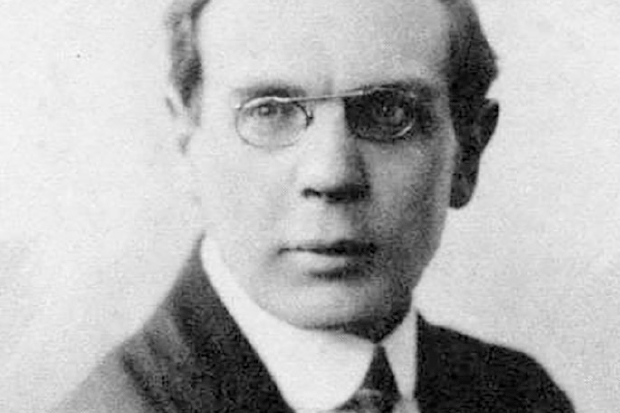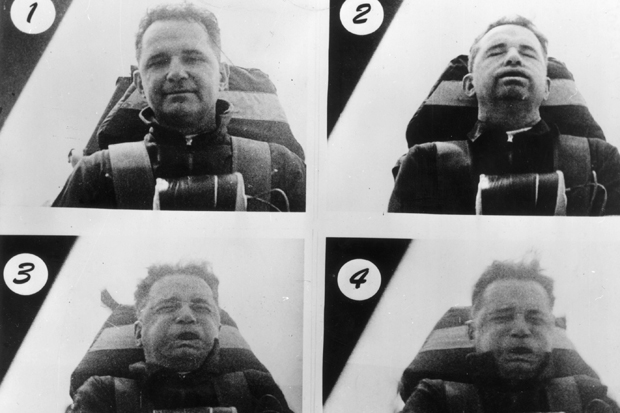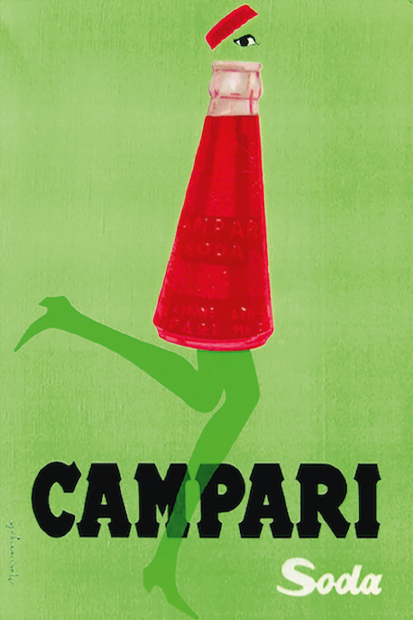The advantage of reviewing books by a friend is that you can invite him out for a walk across the South Downs and menace him with blunt questions. Books pages editors call this sort of thing ‘backscratching’ and ‘logrolling’, as if, instead of engaging in proper criticism, you and your mate had spent the time on a sauna holiday in Sweden. But cronyism lets you discover new things about writing, literature and yourself that are inaccessible to the ordinary critic.
Cornelius Medvei, whose father lives in Sussex, a few fields away from me, has published three novels. They are fables that are witty, wry and thin (in terms of pages) and nobody except Susan Hill and I reads them. The latest one, The Making of Mr Bolsover, is about a local politician who becomes a prophet and ends up living in a wood, cooking rats. On the back cover is a review of Medvei’s first novel, Mr Thundermug. ‘Delightful, unforgettable and splendidly peculiar.’ That review is by me. ‘A book of genius,’ says another review — that’s by Susan Hill.
Cornelius writes ‘like nothing else I have ever read’, says Susan. I’ve met her only once, at a fundraising event for the Emmaus homeless community in Oxford. We instantly forgot about the homeless and talked about Cornelius. About how odd he is; how lanky; how his writing makes you feel he’s been
teleported from the 1920s, part-Kafka, part-John Collier; how at unlikelymparties you turn round and find him standing six inches behind you, quiet and steady as a post; and how he should be in every bookcase.
I’ve had Mr Bolsover on my desk for the past six months. I tore it open the instant it arrived, finished it in two hours, then shoved the book aside in despair. It is brilliant; and, again, it won’t sell.
‘What is wrong with you?’ I demanded as we began our walk up onto the Downs. It was a drizzly day. ‘Why can’t you write a straightforward book that will give you a decent income?’
‘I don’t know,’ groaned Cornelius, bending himself into the wind. ‘I thought this one would do it. It is very funny, it has a strong plot.’
‘And it is full of obscure 19th-century
references to political theory. Why don’t you write about 21st-century issues?’
‘Mr Thundermug was about alienation,’ he protested.
‘The hero was a monkey who spends his time gazing at the sky and having
philosophical thoughts while his wife eats the bugs out of his fur.’
‘Bookshops often put it in the children’s section,’ admitted Cornelius. ‘They don’t know what to make of it.’
‘Couldn’t you include a murder or a love interest — something that the reader can get his teeth into?’
‘My second book, Caroline, was a romantic novel.’
‘About a man who falls in love with a
donkey!’
‘I often find that one in crime,’ agreed Cornelius.
‘And then you have adopted this strange detached style for Mr Bolsover, a sort of arch remoteness, as though you’d attached your pen to the end of a long stick, like Matisse.’
It was at this point that Cornelius, untangling himself over a stile, went rigid and had his insight into types of authors. ‘Each time I write a book I have this oddity that I’m trying to convey. I’m taking the framework set-up for one thing, and trying to make it work for another. With Caroline, for a quadruped. With Mr Bolsover it was political biography. But instead of Gladstone I wanted to see if I could make it work for a Lewes town councillor.’
‘Yet you don’t try to get inside Mr Bolsover’s head, like another novelist would. You don’t explain why he changes from a councillor into a rat-eater.’
‘Precisely! Political biographies don’t. Why did Trotsky become an advocate of permanent revolution? In the biographies there’s a wan passage about him being an idealist, or driven by a sense of mission; but otherwise they pass over it. The motivations for change in these books are either not identified or are banal. In Mr Bolsover’s case, he was hit over the head by a library book.’
‘So you approach your novels as a solution to a puzzle? I do that too. My last book was a biography of an unknown, affectless theoretical mathematician who had forgotten his childhood, didn’t know how to tell anecdotes and whose hobby was going on buses. I wanted to see if one could write an entertaining biography about someone who had nothing to offer the biographical form. It was perverse. I worked on it for five years.’
‘There you go,’ said Cornelius. ‘Did that book sell?’
‘Not a sausage. My agent says he’s never seen so much red ink on anybody’s accounts before.’
‘That’s our difficulty,’ concluded Cornelius.
He paused at a hedge, pushed aside a strand of bramble to reveal a muddy
bridleway and stooped into it. ‘There are different reasons people write, and we’ve got ourselves caught in a wrong one. We don’t take characters and develop them; we set ourselves writing puzzles and try to
solve them. Do you know that story by Somerset Maugham that starts, “I wonder if I can do this?” No? Read it. He is another of us.’
This algebraic attitude to writing also explains why Cornelius’s books take so long. ‘I can see this scene or that twist, but I don’t know the answer overall. I just know the feeling I’m after. I’m always going on at my students about how they should spend more time planning essays before starting writing, but that’s never the way I do it. I just jump in, start writing, chasing this feeling that will be an answer to the puzzle, and get bogged down. It leads to endless points of despair.’
‘I know the sensation perfectly,’ I sighed, kicking a stone and landing my foot in a muddy puddle. ‘The book I’m working on now is based on 150 anonymous diaries. It is an attempt to answer the question: “Can you write a biography of a person when you don’t know who the person is?”’
‘More red ink for your agent,’ commiserated Cornelius.
After I left Cornelius, I walked on across the hills, wondering about this point: is being friends with the author actually an asset to reviewing? Cronyism lets you see the author at work, thinking, still involved in the narrative; it keeps the book alive and supple, unlike the dead slab that lands on the desks of friendless reviewers. By combining debate and mutual criticism, the backscratcher exposes both the author and the inquisitor; it is the only impartial form of critique.
Looking up, I saw the sun breaking through the clouds above Eastbourne, and ambled home, satisfied with Cornelius’s defence of his book and writing, and gently alarmed by his exposure of my own.
Got something to add? Join the discussion and comment below.
Get 10 issues for just $10
Subscribe to The Spectator Australia today for the next 10 magazine issues, plus full online access, for just $10.
Alexander Masters is the author of Stuart: A Life Backwards and The Genius in My Basement.
You might disagree with half of it, but you’ll enjoy reading all of it. Try your first month for free, then just $2 a week for the remainder of your first year.














Comments
Don't miss out
Join the conversation with other Spectator Australia readers. Subscribe to leave a comment.
SUBSCRIBEAlready a subscriber? Log in